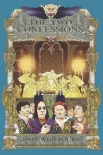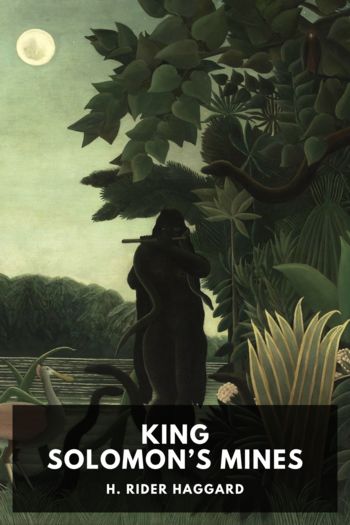The Two Confessions by John Whitbourn (speld decodable readers .TXT) 📗

- Author: John Whitbourn
Book online «The Two Confessions by John Whitbourn (speld decodable readers .TXT) 📗». Author John Whitbourn
‘Youought to go.’
He’dbluntly ignored her question, and she visibly registered that and the new roughedge of his tone. Directly repenting it, Samuel sought to explain.
‘Onlyit's like... well, the Cliffe boys will speak ripe - and there'll be beerflowing and the flaming tar barrels.... Look, miss, ain't you got your ownsociety to go to?’
Sheought to, for every locality banded together to celebrate the day, and only themost prim and proper and unpopular stayed away.
Asanswer she just nodded. And left. Leaving Samuel unsure whether he'd upset orfrightened her, or if she'd simply cut short an inconsequential exchange,forgetting him already. He found he didn't want any of those things to be true.
Shewas still visible for a little while, a pint-sized plump figure threading herway, not noticeably distressed or hurried, up the rapidly filling High Street.He tracked her with his eyes, a hard and hungry, single-minded stare thatothers spotted but thought better than to comment on. There was a final sightof her bonnet and hennaed hair, glimpsed in a gap between a decorated dray andthe Martyrs' monument, and then no more. But Samuel wanted more.
Afterthat he was occupied with things to do; with positioning King Henry anddivesting him of ropes and sheets to be shown forth in all his sordid glory.The animal cheer that greeted the sight showed straightway this would a greatday for Cliffe.
Samueltook full part in it, not stinting himself in anything, from procession, toMass, through to pyrotechnic evening; right until Orphanage gate-time. Evenunder that last spoilsport restraint, he found time to taste beer and breakglass, amply honouring Lewes' long ago deliverance. After that spell ofweakness in Church Twitten, transfixed by the 'elf arrow' as the Downsshepherds would have called it, no one would have noticed anything different tohim.
Yet,all the time, Samuel Trevan was thinking on. Thinking on a single thought.
He had to have her.
U[U[U[U[U[U[U
cHAPTER 6
It wasn't romantic 'love' oranything daft like that. Romance was not exalted in Samuel's world. There was'lust' and 'friendship' and 'affection', but the only 'love' his civilisationrecognised was as mentioned in its holy book - a very different concept. True,infatuation featured in some popular ballads but by and large it stayed there.Too close to the harsh facts of life to revere mere sentiment, Christendom (andeverywhere else as best they knew) looked for better reasons in choosing acompanion for one’s pilgrimage on earth. Piety, inheritance or childbearinghips rated way above attraction.
Samuelknew all this - and accepted it. Even aged fifteen he could well distinguishbetween lechery and deeper longings. It was all the more strange thereforethat, from that day on, without doubt or decrease, he was fired with a newambition. Like a prophet heeding revelation, humbly accepting the newdispensation, he just got on with the unavoidable.
Inall truth, as he soon found out, there was a steep mountain to climb. At thesame time things became much more simple for him - in a complicated sort ofway. He had to have her - and not just in the sexual sense, but haveeverything she represented too. That was the long and the short of it: a life'sproject capable of summary in five words. He had to have her. Whatever it took,that's what he'd spend his time doing. There was no point debating it.
Onceagain, Samuel Trevan uncomplainingly ate what was put before him. Only thistime he was ravenous - and salivating: covetous of a feast intended for hisbetters.
************
She(for it was some time before enquiries grafted on a name) lived in comfort andSouthover. Those two words went together like horse and cart. There were a fewpaupers' places over towards the priory grounds, drawn and protected by thatinstitution, sustained by the charity it offered daily, but otherwise Southoverheld mostly nice houses. Samuel's heart dipped on hearing she emanatedfrom that part of Lewes town.
He'dmoved cautiously to learn what he wanted. There was no question of being socrass as to search her out himself. Neither could he employ anyone who might becurious about his curiosity. This was a weighty matter, too importantfor haste or hostages to fortune. In the few gaps in Orphanage routine hepondered little else. In the Chapel he sought guidance in prayer.
Providencethen sent him an itinerant knife-grinder, a sad crippled veteran of the Welshwars, who did business all over Lewes. From Snowdonia sniper days he'd learntthe art of careful observation - and the joys of silence. For his part, Samuelhad contacts in the Orphanage kitchen and could arrange regular, much needed,business. There was a conversation, skirting round matters of mutual benefit,innocent of crude bargaining. Even then Samuel knew solicitude for otherpeople's dignity, especially among the luckless, was half the battle. Theyeasily came to an arrangement.
Theold soldier plied the streets longer and more attentively than was usual. Itdidn't matter that his stump-leg rubbed raw and his good eye tired: he'd been entrusted,like in past days. Shortly after, the target entered his sights. He reportedback - and got sufficient trade to drink himself to sleep every night for aweek, easing both the inner and outer pain. Each blade in St Philip's, everymetal tool capable of taking an edge, was honed like a barber's razor. FatherOmar was caused to slice his thumb open when peeling an apple.
SamuelTrevan then took charge of the metaphoric musket. She was in his sights now -never to leave them again.
Afew days later the orphans were granted a holiday, consequent on a greatCrusader victory in Latvia - or possibly the Crimea: Samuel was too preoccupiedto take in the details. He made straightaway to Southover.
TheTown was ablaze with bright stars of tin or painted wood - or even paper in thepoorer quarters - to mark the impending nativity. Man's weak imitation of God'snight sky, they symbolised the coming of light into the world - or maybe theStar of Bethlehem: opinions varied. It was just another of those innovationsbrought back by the victorious Crusaders three centuries ago, and now as'traditional' as the twice life-sized crib scene dominating the brow of HighStreet. Pious folk even cast stars up into the boughs of evergreens,





Comments (0)